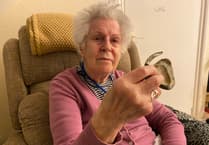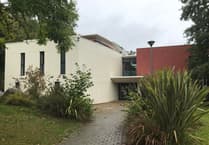They say school days are the happiest of your life and a community project which collected memories of life in the classroom seems to bear this out.
The three-school project in Tavistock collected the recollections of former pupils of the grammar, secondary and comprehensive schools as a social history project.
Former pupils or staff of Tavistock Comprehensive, Dolvin Road Secondary School or Tavistock Grammar School during the years 1926-1966 had their ‘Tales of Three Schools’ recorded for posterity.
This project was run by the Life Stories team at Tavistock Area Support Services (TASS) charity and funded by The National Lottery Heritage Fund. A presentation of a summary of the memories was then given to an audience of anyone interested or who had taken part.
Most of the memories were good, although there were several tales of the ‘discriminatory’ selection process for those chosen to graduate from primary to the grammar school, rather than the comprehensive. The selection was seen as unfair even then and would not happen today.
Ex-pupils at the presentation spoke of being told to stand on their desks if their name was read out as having been chosen to go to the grammar – this was seen as a way of underlining their superiority by physically and metaphorically ‘looking down’ on those ‘not good enough’ to be selected. The selection process was perceived as elitist and with little academic or other merit.
One former grammar pupil certainly had a good time and happy memories of school, including at Bere Alston Primary. Malcolm Sainsbury was selected for the grammar school in 1958 and was delighted to join the ‘big city’ of Tavistock after a childhood in isolated small Bere Ferrers.
“I remember getting the bus and walking up the hill in the snow when the bus couldn’t get through. I liked primary and grammar school. They both gave friends and I liked learning. Going to the grammar school opened up. whole new sporting and social life, it was like going to the big city in comparison.
“But I did lose a whole year of school when my mother got TB when I was six and I was forced to go into a sanatorium in Bovey Tracey as a precaution and separated from my mum, even though I had no symptoms. It was like a prison. Even though I had to catch up a year’s studying, i managed to pass the 11-plus exam to go to grammar – only eight of us went from 30 children.
“I loved sport and still do and I put it down to being banned from playing sport because of TB, even though i didn’t have it. I got to school early to have a knock around with friends and stayed late to play badminton. Even though I was very anti-military at a young age, I was happy to wear school uniform.
“I was in the top ten per cent of the B-stream at the grammar, but it didn’t really translate into any career or higher education ambitions.
“However, I knew I didn’t want to stay on and left school at 16 to go to London and become a civil servant and had an idea I wanted to go abroad. Eventually I did travel a lot through the civil service and had a great time.
“My mum cried for weeks when I left home, my dad told me later. But my parents never pushed me or put pressure on me, they were supportive of whatever I did. I was not afraid of change and there was no painful transition to changing school or anything I did. However, I was very naive living in London and unaware of the dangers facing a teenager. Only decades later did it occur to me how lucky I was not to come to any harm.”





Comments
This article has no comments yet. Be the first to leave a comment.